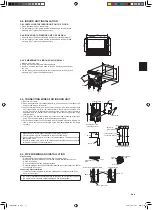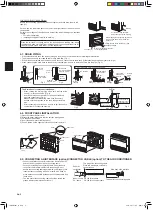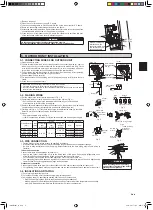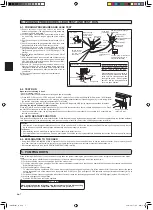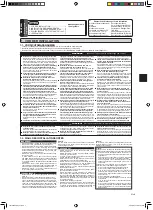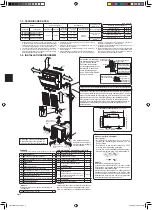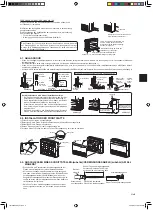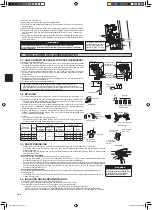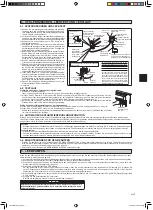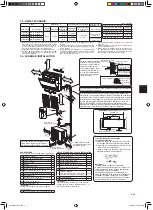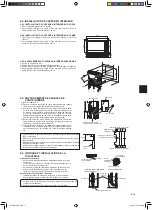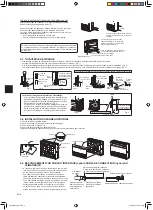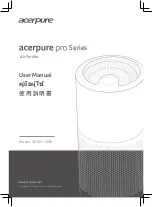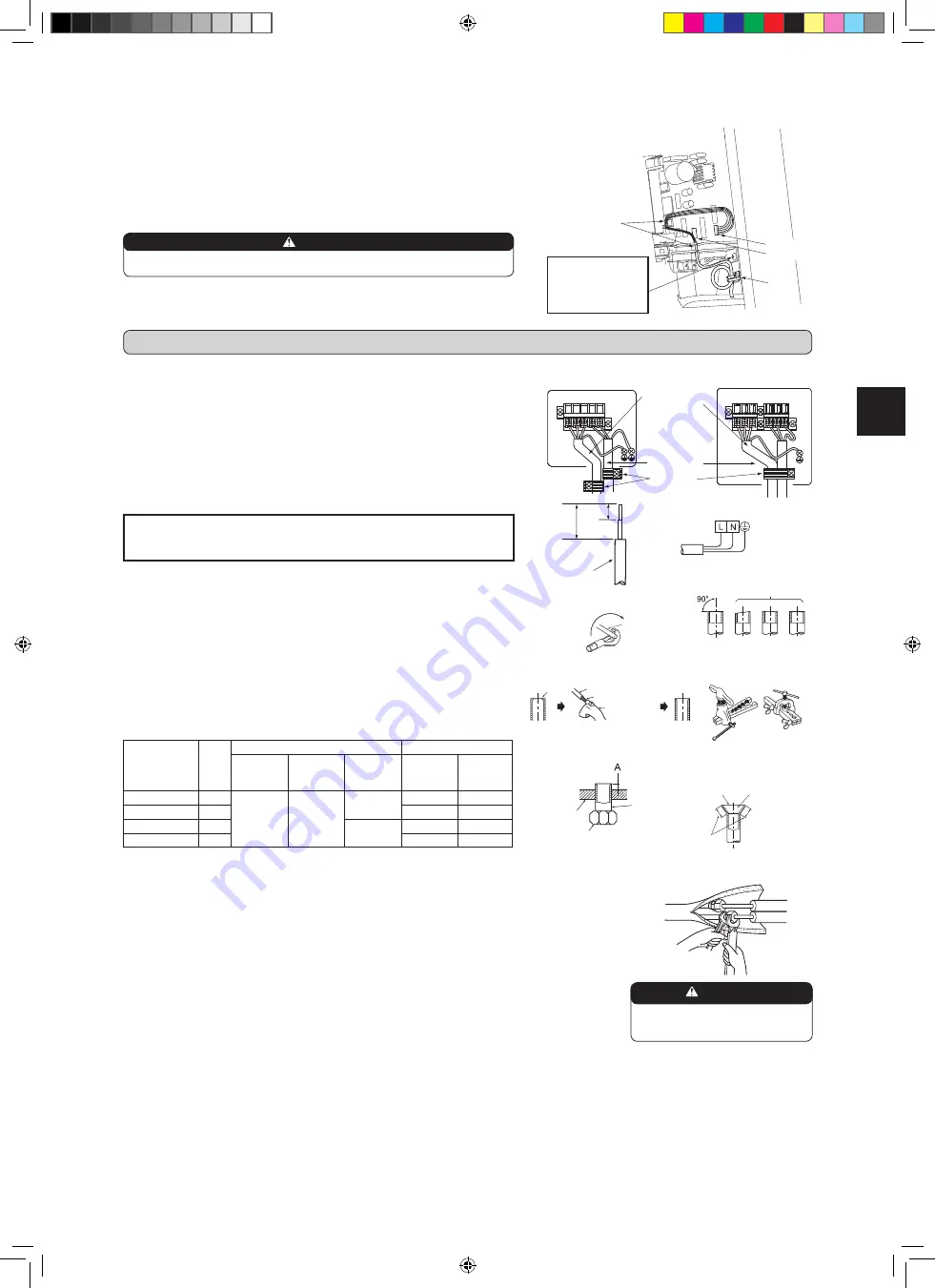
En-
1) Remove the panel.
2) Open the cover of the indoor control P.C. board.
3) Join the connecting cable to CN105 and/or CN104 on the indoor control P.C. board.
4) Route the connecting cable through this point in the figure.
5) Attach the cable clamp provided with interface/connector cable to the thick part of the
connecting cable with a screw 4×16 as shown in the figure.
6) Close the cover of the indoor control P.C. board. Be careful not to catch the thin part
of the connecting cable in the cover. Reinstall the panel.
5)
4)
3) CN105
WARNING
Fix the connecting cable at the prescribed position securely.
Incorrect installation may cause electric shock, fire, and/ or malfunction.
3. ouTDooR uNIT INSTallaTIoN
3-2. FlaRING WoRK
1) Cut the copper pipe correctly with pipe cutter. (Fig. 1, 2)
2) Completely remove all burrs from the cut cross section of pipe. (Fig. 3)
• Put the end of the copper pipe to downward direction as you remove burrs in
order to avoid to let burrs drop in the piping.
3) Remove flare nuts attached to indoor and outdoor units, then put them on pipe having
completed burr removal. (Not possible to put them on after flaring work.)
4) Flaring work (Fig. 4, 5). Firmly hold copper pipe in the dimension shown in the table.
Select A mm from the table according to the tool you use.
5) Check
• Compare the flared work with Fig. 6.
• If flare is noted to be defective, cut off the flared section and do flaring work again.
3-3. PIPE CoNNECTIoN
• Fasten flare nut with a torque wrench as specified in the table.
• When fastened too tight, flare nut may break after a long period and cause refrigerant leakage.
• Be sure to wrap insulation around the piping. Direct contact with the bare piping may result in burns or
frostbite.
Indoor unit connection
Connect both liquid and gas pipings to indoor unit.
• Apply a thin coat of refrigeration oil (J) on the flared ends of the pipes. Do not apply refrigeration oil on
screw threads. Excessive tightening torque will result in damage on the screw.
• For connection, first align the center, then tighten the first 3 to 4 turns of flare nut.
• Use tightening torque table above as a guideline for indoor unit side union joint section, and tighten using
two wrenches. Excessive tightening damages the flare section.
outdoor unit connection
Connect pipes to stop valve pipe joint of the outdoor unit in the same manner applied for indoor unit.
• For tightening, use a torque wrench or spanner and use the same tightening torque applied for indoor unit.
3-4. INSULATION AND TAPING
1) Cover piping joints with pipe cover.
2) For outdoor unit side, surely insulate every piping including valves.
3) Using piping tape (G), apply taping starting from the entry of outdoor unit.
• Stop the end of piping tape (G) with tape (with adhesive agent attached).
• When piping have to be arranged through above ceiling, closet or where the temperature and humidity
are high, wind additional commercially sold insulation to prevent condensation.
Pipe diameter
(mm)
Nut
(mm)
A (mm)
Tightening torque
Clutch type
tool
for R410A
Clutch type
tool
for R22
Wing nut
type tool
for R22
N•m
kgf•cm
ø 6.35 (1/4”)
17
0 to 0.5
1.0 to 1.5
1.5 to 2.0
13.7 to 17.7 140 to 180
ø 9.52 (3/8”)
22
34.3 to 41.2 350 to 420
ø12.7 (1/2”)
26
2.0 to 2.5
49.0 to 56.4 500 to 575
ø15.88 (5/8”)
29
73.5 to 78.4 750 to 800
Copper
pipe
Good
Tilted Uneven Burred
No good
Fig. 1
Fig. 2
Burr
Copper pipe
Spare reamer
Pipe cutter
Clutch type
Flaring tool
Fig. 4
Fig. 3
Smooth all
around
Even length
all around
Inside is shining
without any
scratches.
Flare nut
Die
Fig. 5
Fig. 6
Copper
pipe
Wing nut type
WARNING
When installing the unit, securely
connect the refrigerant pipes before
starting the compressor.
3-1. CoNNECTING WIRES FoR ouTDooR uNIT
1) Open the service panel.
2) Loosen terminal screw, and connect indoor/outdoor unit connecting wire (A) from the
indoor unit correctly on the terminal block. Be careful not to make mis-wiring. Fix the
wire to the terminal block securely so that no part of its core is appeared, and no ex
-
ternal force is conveyed to the connecting section of the terminal block.
3) Firmly tighten the terminal screws to prevent them from loosening. After tightening,
pull the wires lightly to confirm that they do not move.
4) Connect power supply cord (K).
5) Fix indoor/outdoor unit connecting wire (A) and power supply cord (K) with the cord
clamp.
6) Close the service panel securely.
• Make earth wire a little longer than others. (More than 100 mm)
• For future servicing, give extra length to the connecting wires.
• Be sure to attach each screw to its correspondent terminal when securing the cord and/or
the wire to the terminal block.
Terminal block
Cord clamp
Terminal block
Power supply
cord (K)
15 mm
35 mm
Lead wire
<KJ25, 35>
<KJ50>
Indoor/outdoor
unit connecting
wire (A)
Power supply
cord (K)
When mounting the
interface and the
connector cable, use
this screw to fix the
connecting cable.
3) CN104
JG79A762H01_en.indd 6
2013/04/17 (水) 午後 2:45:01





